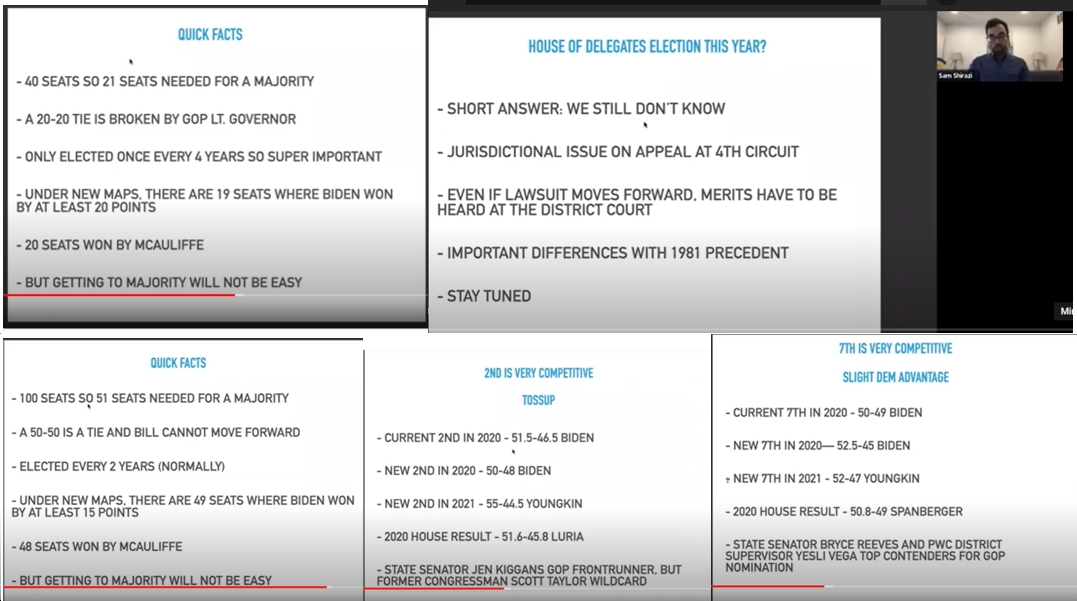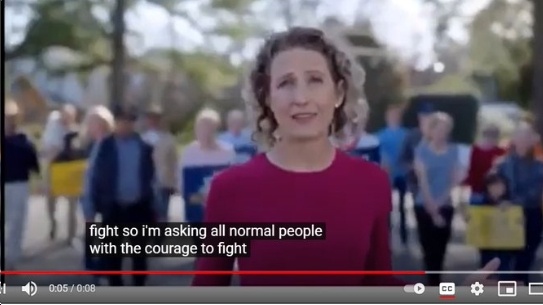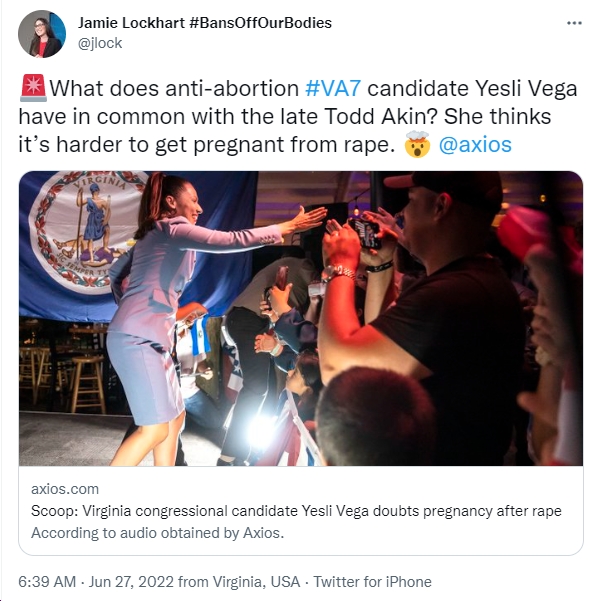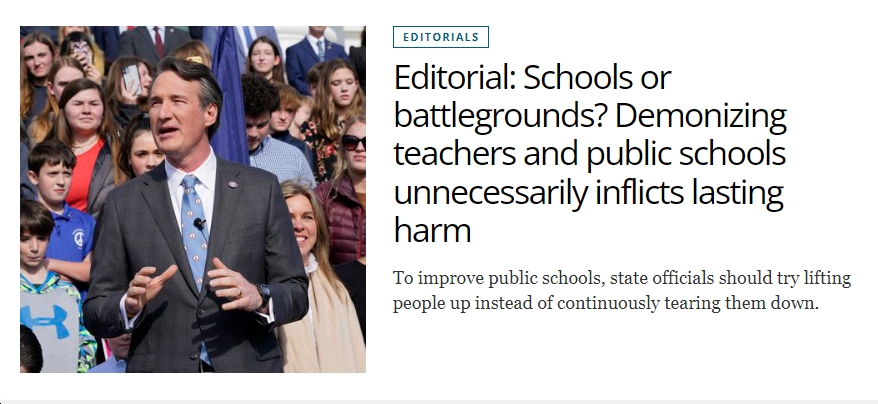See below for the just-released Wason Center poll of likely voters in VA02, one of the most competitive races in the country (according to The Economist’s model, Dems have a 52% chance of winning this district, with a forecast vote share of 50.1%), between Rep. Elaine Luria (D) and right-wing Republican Jen Kiggans. A few takeaways are:
- The race is tied at 45%-45% among likely voters, with 8% still undecided.
- 12% have already voted, with Rep. Luria holding a significant edge (56%-29%) among those voters.
- The top issues among VA02 likely voters are: the economy and inflation, abortion and threats to democracy. Not surprisingly, Democrats care a LOT more about abortion and threats to democracy, while Republicans are focused on the economy and inflation.
- Gov. Youngkin’s approval in the district is at 56% (most of those are supporting Kiggans, while those who disapprove of Youngkin are mostly supporting Luria), while President Biden’s approval is at 41%
Luria, Kiggans knotted up at 45 in VA-2; Independents join Republicans in Making Inflation/Economy Top Issue; Abortion and Threats to Democracy Resonating with Democrats
Youngkin Popular in 2nd, Biden underwater; Republican Voters Have Intensity Edge Almost Two Weeks Out
Summary of Key Findings
- Luria vs. Kiggans are tied among likely voters at 45% in Virginia’s 2nd Congressional District, with 8% still undecided.
- Top of mind issues for likely voters are inflation and the economy (39%), abortion (17%), and threats to democracy (14%).
- For a majority of Democratic likely voters (78%), women (54%), and Black voters (68%) the Supreme Court’s decision to overturn Roe v. Wade is a major factor in their vote choice.
- For Republican likely voters, inflation is a major factor in their vote choice (94%), compared to 44% of Democrats and 65% of Independents.
- A plurality of 2nd District likely voters say President Biden is not much of a factor in their Congressional vote choice (45%), largely driven by 62% of Independents who indicate this position. 79% of Republicans say their vote for Congress is a vote against Biden while 47% of Democrats say theirs is a vote for Biden.
Democrat Rep. Elaine Luria and Republican State Sen. Jen Kiggans are deadlocked 45% to 45% among likely voters in Virginia’s 2nd District Congressional Race with 8% undecided. Voting is well underway and, consistent with national trends, Democrats are more likely to have voted early in the 2nd District race than Republicans. 12% of the voters surveyed have already cast their ballots, and among them Luria has a 56%-29% lead.
Interest in the Congressional elections is fairly high among Democrats and Republicans, with 91% of both partisan groups saying they are paying either a lot or some attention to the elections. Republicans are somewhat more motivated however, with 76% saying they are paying a lot of attention compared to 60% of Democrats; 51% of Independents indicate they are paying a lot of attention and another 28% say some attention.
Key Issues: 2nd District likely voters are asked which issue is top of mind in their vote choice. 39% say the economy, 17% say abortion, and 14% say threats to democracy. Top of mind issues vary by party with a vast majority of Republicans coalescing around inflation and the economy (61%), followed by abortion (9%), and a three-way tie for Republican’s third choice with immigration, crime, and threats to democracy all at 6%. Top issues among Democrats include abortion (31%), threats to democracy (23%), followed by inflation and the economy (16%). A majority of Independents say inflation and the economy (40%), followed by threats to democracy (14%) and abortion (13%).
When asked how much of a factor the U.S. Supreme Court’s decision to overturn Roe v. Wade is in their vote choice, 47% say a major factor, 17% say a minor factor and 34% say it is not a factor. Democrats (78%), women (54%), and Black likely voters (68%) are considerably more likely to say this is a major issue compared to Republicans (22%), men (40%), and white voters (42%). Independents are largely split with 42% saying a major factor, 18% a minor factor and 40% not a factor.
On the issue of inflation, 66% say this is a major factor in their vote choice, 18% a minor factor, and 15% not a factor. Here too we see significant divisions by party with the vast majority of Republicans saying inflation is a major factor (94%) compared to 44% of Democrats and 65% of Independents. Though a majority of men and women see inflation as a major factor there is an 11-point gap (72% to 61%).
A plurality of Virginia likely voters say President Biden is not much of a factor in their Congressional vote choice (45%) compared to 34% who say they think about their choice as a vote against Biden and 18% say it is a vote for Biden. Notably, a majority of Independents say Biden is not much of a factor (62%), while 27% say their vote choice is a vote against Biden, and 8% say a vote for Biden. Among Republicans, 79% say their Congressional vote is a vote against Biden while 21% say Biden is not much of a factor.
“Virginia’s 2nd Congressional District has been known to switch back and forth between the major parties and it appears the seat is still highly competitive, despite new district lines that bring in more Republican voters,” said Dr. Rebecca Bromley-Trujillo, Research Director of the Wason Center. “If this were a typical midterm election year, this district would likely favor the Republican candidate, especially given an unpopular sitting Democratic President and high inflation. Abortion and concern over threats to democracy appear to have energized Democrats and bolstered support for incumbent Rep. Elaine Luria.”
Approval of the President and Governor: Within the 2nd Congressional District, 41% of likely voters approve of President Biden’s job performance compared to 55% who disapprove. As expected, those who approve of Biden are more likely to say they will vote for Rep. Luria (87%) compared to 5% for State Sen. Kiggans. Among those who disapprove, 77% intend to vote for Kiggans, while 15% plan to vote for Luria.
Governor Youngkin has 56% approval in the 2nd District with 34% saying they disapprove and 10% indicating they don’t know. Youngkin’s approval is higher in this Republican leaning district than it was in a statewide poll conducted in late September /early October, where the governor received 50% approval. Among those who approve of the governor’s job performance, 76% intend to vote for Kiggans compared to 15% for Luria. 92% who disapprove of the governor plan to vote for Luria with 3% for Kiggans.
How the survey was conducted:
The results of this poll are based on 820 interviews of registered second congressional district voters who are likely general election voters, including 185 on landline and 635 on cell phone, conducted October 12-18, 2022. A likely general election voter is one who has voted in at least two of the last four general elections or is newly registered in the last 12 months and indicates they are enthusiastic and plan to vote (or already have) in the upcoming November 8 election. The margin of error for the whole survey is +/-3.9% at the 95% level of confidence. This means that if 50% of respondents indicate a topline view on an issue, we can be 95% confident that the population’s view on that issue is somewhere between 46.1% and 53.9%. The margin of error for subgroups may be higher. All error margins have been adjusted to account for the survey’s design effect, which is 1.3 in this survey. The design effect is a factor representing the survey’s deviation from a simple random sample and takes into account decreases in precision due to sample design and weighting procedures. In addition to sampling error, the other potential sources of error include non-response, question wording, and interviewer error. Percentages may not equal 100 due to rounding. The response rate (AAPOR RRI Standard Definition) for the survey was 9%. Five callbacks were employed in the fielding process. Live calling was conducted by trained interviewers at the Wason Center for Civic Leadership survey research lab at Christopher Newport University. The data reported here are weighted using an iterative weighting process on city/county, age, race, sex, and education to reflect as closely as possible the population of the second congressional district’s November 8, 2021 electorate. Parameters for the weights used in this survey come from the 2020 Census and the 2021 American Community Survey 1-Year Estimates.






![“Under Democratic government [the] economy is stronger & crime is lower: those are the facts” – Despite What Republicans and the Media Falsely Tell You](https://bluevirginia.us/wp-content/uploads/2022/11/economymontage.jpg)











